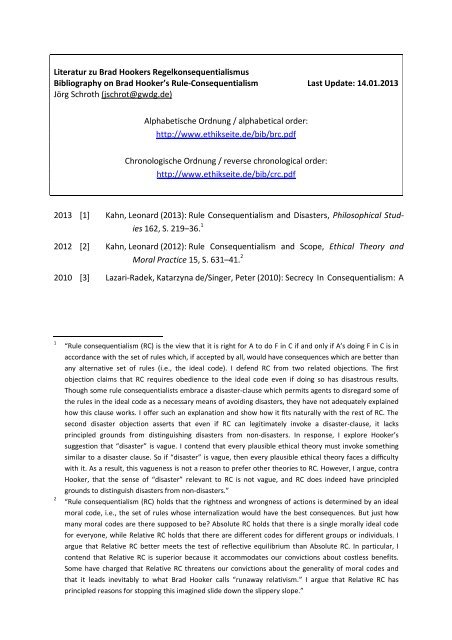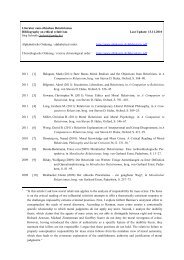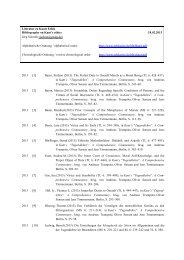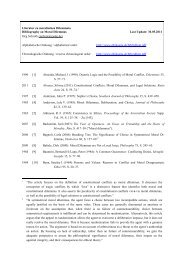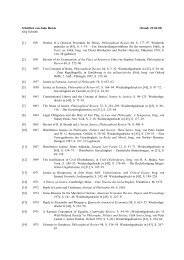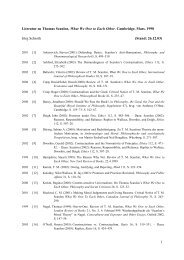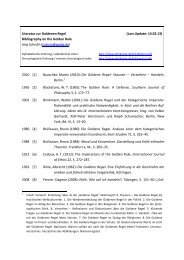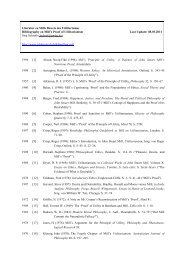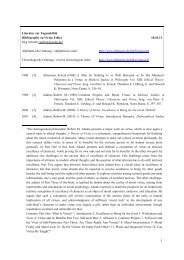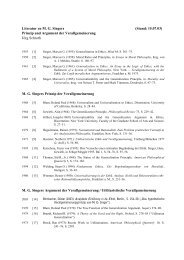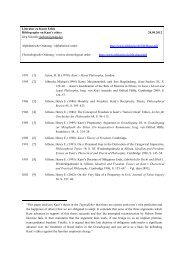Bibliography on Brad Hooker's Rule-consequentialism - Ethikseite
Bibliography on Brad Hooker's Rule-consequentialism - Ethikseite
Bibliography on Brad Hooker's Rule-consequentialism - Ethikseite
You also want an ePaper? Increase the reach of your titles
YUMPU automatically turns print PDFs into web optimized ePapers that Google loves.
Literatur zu <strong>Brad</strong> Hookers Regelk<strong>on</strong>sequentialismus<br />
<str<strong>on</strong>g>Bibliography</str<strong>on</strong>g> <strong>on</strong> <strong>Brad</strong> Hooker’s <strong>Rule</strong>-C<strong>on</strong>sequentialism Last Update: 14.01.2013<br />
Jörg Schroth (jschrot@gwdg.de)<br />
Alphabetische Ordnung / alphabetical order:<br />
http://www.ethikseite.de/bib/brc.pdf<br />
Chr<strong>on</strong>ologische Ordnung / reverse chr<strong>on</strong>ological order:<br />
http://www.ethikseite.de/bib/crc.pdf<br />
2013 [1] Kahn, Le<strong>on</strong>ard (2013): <strong>Rule</strong> C<strong>on</strong>sequentialism and Disasters, Philosophical Studies<br />
162, S. 219–36. 1<br />
2012 [2] Kahn, Le<strong>on</strong>ard (2012): <strong>Rule</strong> C<strong>on</strong>sequentialism and Scope, Ethical Theory and<br />
Moral Practice 15, S. 631–41. 2<br />
2010 [3] Lazari-Radek, Katarzyna de/Singer, Peter (2010): Secrecy In C<strong>on</strong>sequentialism: A<br />
1 “<strong>Rule</strong> c<strong>on</strong>sequentialism (RC) is the view that it is right for A to do F in C if and <strong>on</strong>ly if A’s doing F in C is in<br />
accordance with the set of rules which, if accepted by all, would have c<strong>on</strong>sequences which are better than<br />
any alternative set of rules (i.e., the ideal code). I defend RC from two related objecti<strong>on</strong>s. The first<br />
objecti<strong>on</strong> claims that RC requires obedience to the ideal code even if doing so has disastrous results.<br />
Though some rule c<strong>on</strong>sequentialists embrace a disaster-clause which permits agents to disregard some of<br />
the rules in the ideal code as a necessary means of avoiding disasters, they have not adequately explained<br />
how this clause works. I offer such an explanati<strong>on</strong> and show how it fits naturally with the rest of RC. The<br />
sec<strong>on</strong>d disaster objecti<strong>on</strong> asserts that even if RC can legitimately invoke a disaster-clause, it lacks<br />
principled grounds from distinguishing disasters from n<strong>on</strong>-disasters. In resp<strong>on</strong>se, I explore Hooker’s<br />
suggesti<strong>on</strong> that “disaster” is vague. I c<strong>on</strong>tend that every plausible ethical theory must invoke something<br />
similar to a disaster clause. So if “disaster” is vague, then every plausible ethical theory faces a difficulty<br />
with it. As a result, this vagueness is not a reas<strong>on</strong> to prefer other theories to RC. However, I argue, c<strong>on</strong>tra<br />
Hooker, that the sense of “disaster” relevant to RC is not vague, and RC does indeed have principled<br />
grounds to distinguish disasters from n<strong>on</strong>-disasters.”<br />
2 “<strong>Rule</strong> c<strong>on</strong>sequentialism (RC) holds that the rightness and wr<strong>on</strong>gness of acti<strong>on</strong>s is determined by an ideal<br />
moral code, i.e., the set of rules whose internalizati<strong>on</strong> would have the best c<strong>on</strong>sequences. But just how<br />
many moral codes are there supposed to be? Absolute RC holds that there is a single morally ideal code<br />
for every<strong>on</strong>e, while Relative RC holds that there are different codes for different groups or individuals. I<br />
argue that Relative RC better meets the test of reflective equilibrium than Absolute RC. In particular, I<br />
c<strong>on</strong>tend that Relative RC is superior because it accommodates our c<strong>on</strong>victi<strong>on</strong>s about costless benefits.<br />
Some have charged that Relative RC threatens our c<strong>on</strong>victi<strong>on</strong>s about the generality of moral codes and<br />
that it leads inevitably to what <strong>Brad</strong> Hooker calls “runaway relativism.” I argue that Relative RC has<br />
principled reas<strong>on</strong>s for stopping this imagined slide down the slippery slope.”
Defence of Esoteric Morality, Ratio 23, S. 34–58: S. 44–51. 3 – Vgl. dazu:<br />
Hooker, Publicity In Morality: A Reply to Katarzyna De Lazari-Radek and<br />
Peter Singer, Ratio 23, S. 111–17.<br />
2010 [4] Smith, Holly M. (2010): Measuring the C<strong>on</strong>sequences of <strong>Rule</strong>s, Utilitas 22, S.<br />
413–433. 4<br />
2009 [5] Portmore, Douglas W. (2009): <strong>Rule</strong>-C<strong>on</strong>sequentialism and Irrelevant Others,<br />
Utilitas 21, S. 368–76. 5<br />
2009 [6] Wall, Edmund (2009): Hooker’s C<strong>on</strong>sequentialism and the Depth of Moral Experience,<br />
Dialogue 48, S. 337–51. 6<br />
2008 [7] Hooker, <strong>Brad</strong> (2008): <strong>Rule</strong>-c<strong>on</strong>sequentialism versus Act-c<strong>on</strong>sequentialism, Noti-<br />
zie di Politeia 24, S. 75–85.<br />
2008 [8] Hooker, <strong>Brad</strong>/Fletcher, Guy (2008): Variable versus Fixed-Rate <strong>Rule</strong>-Utilitarian-<br />
ism, Philosophical Quarterly 58, S. 344–52. 7 – Zu [17].<br />
3 “Sidgwick's defence of esoteric morality has been heavily criticized, for example in Bernard Williams's<br />
c<strong>on</strong>demnati<strong>on</strong> of it as 'Government House utilitarianism.' It is also at odds with the idea of morality<br />
defended by Kant, Rawls, Bernard Gert, <strong>Brad</strong> Hooker, and T.M. Scanl<strong>on</strong>. Yet it does seem to be an<br />
implicati<strong>on</strong> of c<strong>on</strong>sequentialism that it is sometimes right to do in secret what it would not be right to do<br />
openly, or to advocate publicly. We defend Sidgwick <strong>on</strong> this issue, and show that accepting the possibility<br />
of esoteric morality makes it possible to explain why we should accept c<strong>on</strong>sequentialism, even while we<br />
may feel disapproval towards some of its implicati<strong>on</strong>s.”<br />
4 “Recently two distinct forms of rule-utilitarianism have been introduced that differ <strong>on</strong> how to measure the<br />
c<strong>on</strong>sequences of rules. <strong>Brad</strong> Hooker advocates fixed-rate rule-utilitarianism (which measures the expected<br />
value of the rule’s c<strong>on</strong>sequences at a 90 percent acceptance rate), while Michael Ridge advocates<br />
variable-rate rule-utilitarianism (which measures the average expected value of the rule’s c<strong>on</strong>sequences<br />
for all different levels of social acceptance). I argue that both of these are inferior to a new proposal,<br />
optimum-rate rule-utilitarianism. According to optimum-rate rule-utilitarianism, an ideal code is the code<br />
whose optimum acceptance level is no lower than that of any alternative code. I then argue that all three<br />
forms of rule-utilitarianism fall prey to two fatal problems that leave us without any viable form of rule-<br />
utilitarianism.”<br />
5 “In this article, I argue that <strong>Brad</strong> Hooker’s rule-c<strong>on</strong>sequentialism implausibly implies that what earthlings<br />
are morally required to sacrifice for the sake of helping their less fortunate brethren depends <strong>on</strong> whether<br />
or not other people exist <strong>on</strong> some distant planet even when these others would be too far away for<br />
earthlings to affect.”<br />
6 “In Ideal Code, Real World, <strong>Brad</strong> Hooker seeks to offer a versi<strong>on</strong> of ideal rule c<strong>on</strong>sequentialism that is<br />
immune from standard criticisms. I will attempt to challenge Hooker’s ideal rule-c<strong>on</strong>sequentialist theory<br />
by arguing that there are philosophical problems at the ultimate foundati<strong>on</strong> of his maximizing<br />
c<strong>on</strong>sequentialist and pluralist approach toward well-being and other basic goods. I find that no amount of<br />
revisi<strong>on</strong> is likely to insulate his approach from standard criticisms. I suggest that any maximizing rule-<br />
c<strong>on</strong>sequentialist approach toward well-being, taken in a rich and pluralist sense, is likely to fall prey to<br />
standard criticisms. In later work, Hooker drops ideal rule c<strong>on</strong>sequentialism in favor of an incremental<br />
rule-c<strong>on</strong>sequentialist approach. That piecemeal approach is also challenged in this paper.”
2008 [9] Pellegrino, Gianfranco (2008): Some OId Objecti<strong>on</strong>s to <strong>Rule</strong>-C<strong>on</strong>sequentialism<br />
Rec<strong>on</strong>sidered: The Case of Reproductive Freedom, Notizie di Politeia 24,<br />
S. 98–107.<br />
2008 [10] Woodard, Christopher (2008): A New Argument Against <strong>Rule</strong> C<strong>on</strong>sequentialism,<br />
Ethical Theory and Moral Practice 11, S. 247–61. 8<br />
2007 [11] Brand-Ballard, Jeffrey (2007): Why One Basic Principle?, Utilitas 19, S. 220–242. 9<br />
2007 [12] Card, Robert F. (2007): Inc<strong>on</strong>sistency and the Theoretical Commitments of<br />
Hooker’s <strong>Rule</strong>-C<strong>on</strong>sequentialism, Utilitas 19, S. 243–58. 10 – Dazu: [14].<br />
7 “Fixed-rate versi<strong>on</strong>s of rule-c<strong>on</strong>sequentialism and rule-utilitarianism evaluate rules in terms of the<br />
expected net value of <strong>on</strong>e particular level of social acceptance, but <strong>on</strong>e far enough below 100% social<br />
acceptance to make salient the complexities created by partial compliance. Variable-rate versi<strong>on</strong>s of rule-<br />
c<strong>on</strong>sequentialism and rule-utilitarianism instead evaluate rules in terms of their expected net value at all<br />
different levels of social acceptance. <strong>Brad</strong> Hooker has advocated a fixed-rate versi<strong>on</strong>. Michael Ridge has<br />
argued that the variable-rate versi<strong>on</strong> is better. The debate c<strong>on</strong>tinues here. Of particular interest is the<br />
difference between the implicati<strong>on</strong>s of Hooker’s and Ridge’s rules about doing good for others.”<br />
8 “We best understand <strong>Rule</strong> C<strong>on</strong>sequentialism as a theory of pattern-based reas<strong>on</strong>s, since it claims that we<br />
have reas<strong>on</strong>s to perform some acti<strong>on</strong> because of the goodness of the pattern c<strong>on</strong>sisting of widespread<br />
performance of the same type of acti<strong>on</strong> in the same type of circumstances. Plausible forms of <strong>Rule</strong><br />
C<strong>on</strong>sequentialism are also pluralist, in the sense that, al<strong>on</strong>gside pattern-based reas<strong>on</strong>s, they recognise<br />
ordinary act-based reas<strong>on</strong>s, based <strong>on</strong> the goodness of individual acti<strong>on</strong>s. However, <strong>Rule</strong> C<strong>on</strong>sequentialist<br />
theories are distinguished from other pluralist theories of pattern-based reas<strong>on</strong>s by implausible claims<br />
about the relative importance of act-based and pattern-based reas<strong>on</strong>s in different cases. <strong>Rule</strong><br />
C<strong>on</strong>sequentialists should give up these claims. They should either embrace some other pluralist pattern-<br />
based view, or reject pattern-based reas<strong>on</strong>s altogether. Note, though, that these arguments apply <strong>on</strong>ly to<br />
compliance-based, rather than acceptance-based, versi<strong>on</strong>s of <strong>Rule</strong> C<strong>on</strong>sequentialism. This suggests that<br />
these two kinds of theory are more different from each other than we might previously have realised.”<br />
9 “Principle m<strong>on</strong>ists believe that our moral duties, such as fidelity and n<strong>on</strong>-maleficence, can be justified in<br />
terms of <strong>on</strong>e basic moral principle. Principle pluralists disagree, some suggesting that <strong>on</strong>ly an excessive<br />
taste for simplicity or a desire to mimic natural science could lead <strong>on</strong>e to endorse m<strong>on</strong>ism. In Ideal Code,<br />
Real World (Oxford, 2000), <strong>Brad</strong> Hooker defends a m<strong>on</strong>ist theory, employing the method of reflective<br />
equilibrium to unify the moral duties under a versi<strong>on</strong> of rule c<strong>on</strong>sequentialism. Hooker’s arguments have<br />
drawn powerful criticisms from pluralists such as Alan Thomas, Phillip M<strong>on</strong>tague and Philip Stratt<strong>on</strong>-Lake.<br />
Against these critics, I argue that Hooker’s m<strong>on</strong>ism enjoys certain practical advantages associated with the<br />
simplicity of a single basic principle. These advantages are often overlooked because they appear primarily<br />
in cases of sec<strong>on</strong>d-order deliberati<strong>on</strong>, in which <strong>on</strong>e must decide whether our basic moral duties support a<br />
certain derivative duty. I argue that these advantages of m<strong>on</strong>ism over pluralism are analogous to the<br />
advantages that generalists claim over moral particularism. Because pluralists are generalists, I c<strong>on</strong>clude<br />
that they are in an awkward dialectical positi<strong>on</strong> to dismiss Hooker’s m<strong>on</strong>ism for the reas<strong>on</strong>s they usually<br />
offer.”<br />
10 “<strong>Rule</strong>-c<strong>on</strong>sequentialism is frequently regarded as problematic since it faces the following powerful<br />
dilemma: either rule-c<strong>on</strong>sequentialism collapses into act-c<strong>on</strong>sequentialism or rule-c<strong>on</strong>sequentialism is<br />
inc<strong>on</strong>sistent. Recent defenders of this theory such as <strong>Brad</strong> Hooker provide a careful resp<strong>on</strong>se to this<br />
objecti<strong>on</strong>. By explicating the nature and theoretical commitments of rule-c<strong>on</strong>sequentialism, I c<strong>on</strong>tend that<br />
these maneuvers are not successful by offering a new way of viewing the dilemma which retains its force
2007 [13] Egglest<strong>on</strong>, Ben (2007): C<strong>on</strong>flicts of <strong>Rule</strong>s in Hooker’s <strong>Rule</strong>-C<strong>on</strong>sequentialism,<br />
Canadian Journal of Philosophy 37, S. 329–50.<br />
2007 [14] Hooker, <strong>Brad</strong> (2007): <strong>Rule</strong>-c<strong>on</strong>sequentialism and Internal C<strong>on</strong>sistency: A Reply to<br />
Card, Utilitas 19, S. 514–519. 11 – Zu [12].<br />
2006 [15] Hooker, <strong>Brad</strong> (2006): Feldman, <strong>Rule</strong>-c<strong>on</strong>sequentialism, and Desert, in The Good,<br />
the Right, Life and Death. Essays in H<strong>on</strong>or of Fred Feldman, hrsg. v<strong>on</strong> Kris<br />
McDaniel, Jas<strong>on</strong> R. Raibley, Richard Feldman und Michael J. Zimmerman,<br />
Aldershot, S. 103–14.<br />
2006 [16] Hooker, <strong>Brad</strong> (2006): Right, Wr<strong>on</strong>g, and <strong>Rule</strong>-C<strong>on</strong>sequentialism, in The Blackwell<br />
Guide to Mill’s Utilitarianism, hrsg. v<strong>on</strong> Henry R. West, Oxford, S. 233–48.<br />
2006 [17] Ridge, Michael (2006): Introducing Variable-Rate <strong>Rule</strong>-Utilitarianism, Philosophi-<br />
cal Quarterly 56, S. 242–53. 12 – Vgl. dazu [8].<br />
2006 [18] Skorupski, John (2006): Welfare and Self-Governance, Ethical Theory and Moral<br />
Practice 9, S. 289–309: S. 298–301. 13<br />
2005 [19] Arnes<strong>on</strong>, Richard (2005): Sophisticated <strong>Rule</strong> C<strong>on</strong>sequentialism: Some Simple<br />
Objecti<strong>on</strong>s, Philosophical Issues 15 (1), 235–251. – Dazu: [20].<br />
2005 [20] Hooker, <strong>Brad</strong> (2005): Reply to Arnes<strong>on</strong> and McIntyre, Philosophical Issues 15 (1),<br />
264–281. – Zu [19] und [21].<br />
2005 [21] McIntyre, Alis<strong>on</strong> (2005): The Perils of Holism: <strong>Brad</strong> Hooker’s Ideal Code, Real<br />
even in light of these recent discussi<strong>on</strong>s. The central idea is that even the most well-developed<br />
c<strong>on</strong>temporary form of the view is ensnared in the following dilemma: as an agent-neutral c<strong>on</strong>sequentialist<br />
theory, rule-c<strong>on</strong>sequentialism is either inc<strong>on</strong>sistent or it is desperately unmotivated as a form of<br />
c<strong>on</strong>sequentialism since it is committed to a n<strong>on</strong>-c<strong>on</strong>sequentialist form of ultimate moral value.”<br />
11 “<strong>Rule</strong>-c<strong>on</strong>sequentialism has been accused of either collapsing into act-c<strong>on</strong>sequentialism or being<br />
internally inc<strong>on</strong>sistent. I have tried to develop a form of rule-c<strong>on</strong>sequentialism without these flaws. In this<br />
June’s issue of Utilitas, Robert Card argued that I have failed. Here I assess his arguments.”<br />
12 “The basic idea of rule-utilitarianism is that right acti<strong>on</strong> should be defined in terms of what would be<br />
required by rules which would maximize either actual or expected utility if those rules gained general<br />
acceptance, or perhaps general compliance. <strong>Rule</strong>-utilitarians face a dilemma. They must characterize<br />
‘general acceptance’ either as 100% acceptance, or as something less. On the first horn of the dilemma,<br />
rule-utilitarianism is vulnerable to the charge of utopianism; <strong>on</strong> the sec<strong>on</strong>d, it is open to the charge of<br />
arbitrariness and lack of philosophical depth. I press this objecti<strong>on</strong>, and develop and defend an alternative<br />
versi<strong>on</strong> of rule-utilitarianism which can evade the dilemma. I call this new versi<strong>on</strong> ‘variable-rate rule-<br />
utilitarianism’.”<br />
13 “Two ideas have dominated ethical thought since the time of Bentham and Kant. One is utilitarianism, the<br />
other is an idea of moral agency as self-governance. Utilitarianism says that morality must somehow<br />
subserve welfare, self-governance says that it must be graspable directly by individual moral insight. But<br />
these ideas seem to war with <strong>on</strong>e another. Can we eliminate the apparent c<strong>on</strong>flict by a careful review of<br />
what is plausible in the two ideas? In seeking an answer to this questi<strong>on</strong> I examine (1) the implicati<strong>on</strong>s of<br />
welfarism, (2) the nature of moral obligati<strong>on</strong> (3) the nature of our moral knowledge.”
World, Philosophical Issues 15 (1), 252–263. – Dazu: [20].<br />
2004 [22] Lawlor, Rob (2004): Hooker’s Ideal Code and the Sacrifice Problem, Social Theory<br />
and Practice 30, S. 583–88.<br />
2004 [23] Schroth, Jörg (2004): Review of Hooker, Ideal Code, Real World, Ethical Theory<br />
and Moral Practice 7, S. 91—94.<br />
2004 [24] Timm<strong>on</strong>s, Mark (2004): Critical Notice of Hooker, Ideal Code, Real World, Philos-<br />
ophy and Phenomenological Research 69, S. 240–43.<br />
2003 [25] Harris, George W. (2003): Review of Hooker, Ideal Code, Real World, Ethics 113,<br />
S. 882–85.<br />
2003 [26] Hooker, <strong>Brad</strong> (2003): <strong>Rule</strong>-c<strong>on</strong>sequentialism, in The Stanford Encyclopedia of<br />
Philosophy, hrsg. v<strong>on</strong> Edward N. Zalta,<br />
http://plato.stanford.edu/entries/c<strong>on</strong>sequentialism-rule/.<br />
2003 [27] Lenman, James (2003): Review of Hooker, Ideal Code, Real World, Philosophical<br />
Books 44, S. 181–83.<br />
2002 [28] Driver, Julia (2002): Review of Hooker, Ideal Code, Real World, Notre Dame Phil-<br />
osophical Reviews 2002.06.03,<br />
http://ndpr.nd.edu/review.cfm?id=1136.<br />
2002 [29] Hooker, <strong>Brad</strong> (2002): Intuiti<strong>on</strong>s and Moral Theorizing, in Ethical Intuiti<strong>on</strong>ism. Re-<br />
evaluati<strong>on</strong>s, hrsg. v<strong>on</strong> Philip Stratt<strong>on</strong>-Lake, Oxford, S. 161–83.<br />
2002 [30] Hooker, <strong>Brad</strong> (2002): The Collapse of Virtue Ethics, Utilitas 14, S. 22–40. – Dazu:<br />
[31].<br />
2002 [31] Hursthouse, Rosalind (2002): Virtue Ethics vs. <strong>Rule</strong>-C<strong>on</strong>sequentialism: A Reply to<br />
<strong>Brad</strong> Hooker, Utilitas 14, S. 41–53. – Zu [30].<br />
2002 [32] Moore, Andrew (2002): Review of Hooker, Ideal Code, Real World, Australasian<br />
Journal of Philosophy 80, S. 113f.<br />
2002 [33] Mulgan, Tim (2002): Review of Hooker, Ideal Code, Real World, Philosophical<br />
Quarterly 52, S. 418–20.<br />
2001 [34] Audi, Robert (2001): Review of Hooker, Ideal Code, Real World, Utilitas 13, S.<br />
357–59.<br />
2001 [35] Carls<strong>on</strong>, Erik (2001): Review of Hooker, Ideal Code, Real World, Theoria 67, S.<br />
268–72.<br />
2001 [36] Mulgan, Tim (2001): The Demands of C<strong>on</strong>sequentialism, Oxford, S. 58–67, 75f.,<br />
77–82, 97f.<br />
2001 [37] Pettit, Philip (2001): Review of Hooker, Ideal Code, Real World, Times Literary
Supplement 5139, S. 28.<br />
2001 [38] Shaw, William H. (2001): Review of Hooker, Ideal Code, Real World, Mind 110, S.<br />
1074–77.<br />
2000 [39] Haslett, D. W. (2000): Values, Obligati<strong>on</strong>s, and Saving Lives, in Morality, <strong>Rule</strong>s,<br />
and C<strong>on</strong>sequences. A Critical Reader, hrsg. v<strong>on</strong> <strong>Brad</strong> Hooker, Elinor<br />
Mas<strong>on</strong> und Dale E. Miller, Edinburgh, S. 71–104.<br />
2000 [40] Hooker, <strong>Brad</strong> (2000): <strong>Rule</strong>-C<strong>on</strong>sequentialism, in The Blackwell Guide to Ethical<br />
Theory, hrsg. v<strong>on</strong> Hugh LaFollette, Oxford, S. 183–204.<br />
2000 [41] Hooker, <strong>Brad</strong> (2000): Impartiality, Predictability, and Indirect C<strong>on</strong>sequentialism,<br />
in Well-Being and Morality. Essays in H<strong>on</strong>our of James Griffin, hrsg. v<strong>on</strong><br />
Roger Crisp und <strong>Brad</strong> Hooker, Oxford, S. 129–42.<br />
2000 [42] Hooker, <strong>Brad</strong> (2000): Reflective Equilibrium and <strong>Rule</strong> C<strong>on</strong>sequentialism, in Mo-<br />
rality, <strong>Rule</strong>s, and C<strong>on</strong>sequences. A Critical Reader, hrsg. v<strong>on</strong> <strong>Brad</strong> Hooker,<br />
Elinor Mas<strong>on</strong> und Dale E. Miller, Edinburgh, S. 222–38.<br />
2000 [43] Hooker, <strong>Brad</strong> (2000): Ideal Code, Real World. A <strong>Rule</strong>-C<strong>on</strong>sequentialist Theory of<br />
Morality, Oxford.<br />
2000 [44] Hooker, <strong>Brad</strong>/Mas<strong>on</strong>, Elinor/Miller, Dale E. (Hrsg.) (2000): Morality, <strong>Rule</strong>s, and<br />
C<strong>on</strong>sequences. A Critical Reader, Edinburgh.<br />
2000 [45] Kagan, Shelly (2000): Evaluative Focal Points, in Morality, <strong>Rule</strong>s, and C<strong>on</strong>se-<br />
quences. A Critical Reader, hrsg. v<strong>on</strong> <strong>Brad</strong> Hooker, Elinor Mas<strong>on</strong> und Dale<br />
E. Miller, Edinburgh, S. 134–55.<br />
2000 [46] Levy, Sanford S. (2000): The Educati<strong>on</strong>al Equivalence of Act and <strong>Rule</strong> Utilitarian-<br />
ism, in Morality, <strong>Rule</strong>s, and C<strong>on</strong>sequences. A Critical Reader, hrsg. v<strong>on</strong><br />
<strong>Brad</strong> Hooker, Elinor Mas<strong>on</strong> und Dale E. Miller, Edinburgh, S. 27–39.<br />
2000 [47] Ly<strong>on</strong>s, David (2000): The Moral Opacity of Utilitarianism, in Morality, <strong>Rule</strong>s, and<br />
C<strong>on</strong>sequences. A Critical Reader, hrsg. v<strong>on</strong> <strong>Brad</strong> Hooker, Elinor Mas<strong>on</strong><br />
und Dale E. Miller, Edinburgh, S. 105–20.<br />
2000 [48] Miller, Dale E. (2000): Hooker’s Use and Abuse of Reflective Equilibrium, in Mo-<br />
rality, <strong>Rule</strong>s, and C<strong>on</strong>sequences. A Critical Reader, hrsg. v<strong>on</strong> <strong>Brad</strong> Hooker,<br />
Elinor Mas<strong>on</strong> und Dale E. Miller, Edinburgh, S. 156–78.<br />
2000 [49] M<strong>on</strong>tague, Phillip (2000): Why <strong>Rule</strong> C<strong>on</strong>sequentialism is not Superior to Ross-<br />
style Pluralism, in Morality, <strong>Rule</strong>s, and C<strong>on</strong>sequences. A Critical Reader,<br />
hrsg. v<strong>on</strong> <strong>Brad</strong> Hooker, Elinor Mas<strong>on</strong> und Dale E. Miller, Edinburgh, S.<br />
203–11.<br />
2000 [50] Mulgan, Tim (2000): Ruling Out <strong>Rule</strong> C<strong>on</strong>sequentialism, in Morality, <strong>Rule</strong>s, and<br />
C<strong>on</strong>sequences. A Critical Reader, hrsg. v<strong>on</strong> <strong>Brad</strong> Hooker, Elinor Mas<strong>on</strong>
und Dale E. Miller, Edinburgh, S. 212–21.<br />
2000 [51] Pettit, Philip/Smith, Michael (2000): Global C<strong>on</strong>sequentialism, in Morality, <strong>Rule</strong>s,<br />
and C<strong>on</strong>sequences. A Critical Reader, hrsg. v<strong>on</strong> <strong>Brad</strong> Hooker, Elinor<br />
Mas<strong>on</strong> und Dale E. Miller, Edinburgh, S. 121–133.<br />
2000 [52] Powers, Madis<strong>on</strong> (2000): <strong>Rule</strong> C<strong>on</strong>sequentialism and the Value of Friendship, in<br />
Morality, <strong>Rule</strong>s, and C<strong>on</strong>sequences. A Critical Reader, hrsg. v<strong>on</strong> <strong>Brad</strong><br />
Hooker, Elinor Mas<strong>on</strong> und Dale E. Miller, Edinburgh, S. 239–56.<br />
2000 [53] Riley, J<strong>on</strong>athan (2000): Defending <strong>Rule</strong> Utilitarianism, in Morality, <strong>Rule</strong>s, and<br />
C<strong>on</strong>sequences. A Critical Reader, hrsg. v<strong>on</strong> <strong>Brad</strong> Hooker, Elinor Mas<strong>on</strong><br />
und Dale E. Miller, Edinburgh, S. 40–70.<br />
2000 [54] Thomas, Alan (2000): C<strong>on</strong>sequentialism and the Subversi<strong>on</strong> of Pluralism, in Mo-<br />
rality, <strong>Rule</strong>s, and C<strong>on</strong>sequences. A Critical Reader, hrsg. v<strong>on</strong> <strong>Brad</strong> Hooker,<br />
Elinor Mas<strong>on</strong> und Dale E. Miller, Edinburgh, S. 179–202.<br />
1999 [55] Hooker, <strong>Brad</strong> (1999): Sacrificing for the Good of Strangers – Repeatedly, Phi-<br />
losophy and Phenomenological Research 59, S. 177–81.<br />
1999 [56] Law, Iain (1999): <strong>Rule</strong>-C<strong>on</strong>sequentialism’s Dilemma, Ethical Theory and Moral<br />
Practice 2, S. 263–76.<br />
1998 [57] Hooker, <strong>Brad</strong> (1998): <strong>Rule</strong>-C<strong>on</strong>sequentialism and Obligati<strong>on</strong>s Toward the Needy,<br />
Pacific Philosophical Quarterly 79, S. 19–33.<br />
1997 [58] Hooker, <strong>Brad</strong> (1997): Reply to Stratt<strong>on</strong>-Lake, Mind 106, S. 759f. – Zu [59].<br />
1997 [59] Stratt<strong>on</strong>-Lake, Philip (1997): Can Hooker’s <strong>Rule</strong>-C<strong>on</strong>sequentialist Principle Justify<br />
Ross’s Prima Facie Duties?, Mind 106, S. 151–58. – Zu [60]. Dazu: [58].<br />
1996 [60] Hooker, <strong>Brad</strong> (1996): Ross-Style Pluralism versus <strong>Rule</strong>-C<strong>on</strong>sequentialism, Mind<br />
105, S. 531–552. – Dazu: [59].<br />
1996 [61] Mulgan, Tim (1996): One False Virtue of <strong>Rule</strong> C<strong>on</strong>sequentialism, and One New<br />
Vice, Pacific Philosophical Quarterly 77, S. 362ff.<br />
1995 [62] Hooker, <strong>Brad</strong> (1995): <strong>Rule</strong>-C<strong>on</strong>sequentialism, Incoherence, Fairness, Proceedings<br />
of the Aristotelian Society 95, S. 19–35<br />
1994 [63] Hooker, <strong>Brad</strong> (1994): Is <strong>Rule</strong>-C<strong>on</strong>sequentialism a Rubber Duck?, Analysis 54, S.<br />
92–97.<br />
1994 [64] Mulgan, Tim (1994): <strong>Rule</strong> C<strong>on</strong>sequentialism and Famine, Analysis 54, S. 187.<br />
1993 [65] Howard-Snyder, Frances (1993): <strong>Rule</strong> C<strong>on</strong>sequentialism is a Rubber Duck, Amer-<br />
ican Philosophical Quarterly 30, S. 271–78.<br />
1991 [66] Cars<strong>on</strong>, Thomas L. (1991): A Note <strong>on</strong> Hooker’s “<strong>Rule</strong> C<strong>on</strong>sequentialism”, Mind
100, S. 117–21. – Dazu: [67].<br />
1991 [67] Hooker, <strong>Brad</strong> (1991): <strong>Rule</strong>-C<strong>on</strong>sequentialism and Demandingness: A Reply to<br />
Cars<strong>on</strong>, Mind 100, S. 269–76. – Zu [66].<br />
1990 [68] Hooker, <strong>Brad</strong> (1990): <strong>Rule</strong>-C<strong>on</strong>sequentialism, Mind 99, S. 67–77. Wiederabge-<br />
druckt in Character and C<strong>on</strong>duct, hrsg. v<strong>on</strong> Mark Timm<strong>on</strong>s, 5. Auflage,<br />
Belm<strong>on</strong>t, CA, 2006.


